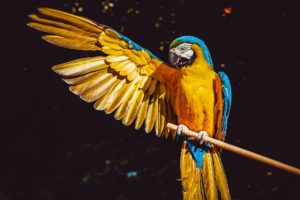Did you know that birds sometimes chew or pull out their feathers? Feather plucking is a self-harming behavior in birds. While any bird can do this, it’s most common in parrots and cockatoos. A Macc, GA vet discusses feather plucking below.
Symptoms
If you catch Polly in the act, then you’ll of course know what’s going on. Other indications include dry, flaky, or red skin; cuts or wounds from biting; skin infections; and damaged, unkempt, or missing feathers. Your winged friend may also act stressed or uneasy. Contact your vet if you notice any of these things.
Causes
In order to address feather plucking, you’ll need to figure out what’s behind it. Feather plucking is often an emotional reaction to stress. Birds may become anxious for many reasons, such as changing owners, being left alone too much, moving to a new house, overstimulation (such as too much noise or commotion), or even just being on a schedule they don’t like. Boredom, loneliness, and jealousy are also potential causes. Polly could also pluck as a response to health issues, such as malnutrition, parasites, toxins, allergies, or a poor environment. Low humidity, metabolic issues, or even hormonal changes are also possibilities.
Treatment
The treatment for feather plucking will of course depend on the cause. You’ll want to start by ruling out any medical issues, such as hormonal imbalances or lead toxicity. If a health issue is the reason, your vet will be able to discuss treatment options once the problem has been diagnosed. While feathers can grow back, this can take some time. In the meantime, Polly will be susceptible to skin problems, and will have difficulty regulating her temperature. You may also need to fit your feathered buddy with a collar to preserve her plumage from further damage, and/or a sweater to keep her warm when it’s chilly out. Ask your vet for care tips.
Prevention
The best way to reduce and/or prevent plucking is to keep Polly healthy and happy. That means providing her with a clean, roomy cage; ample toys and perches; regular baths; and, of course, lots of TLC. Even small touches, like offering treats and leaving a radio on when you leave, can help. Ask your vet for more information.
Do you know or suspect that your bird is plucking her feathers? Contact us, your local Dahlonega, GA animal hospital, today!

